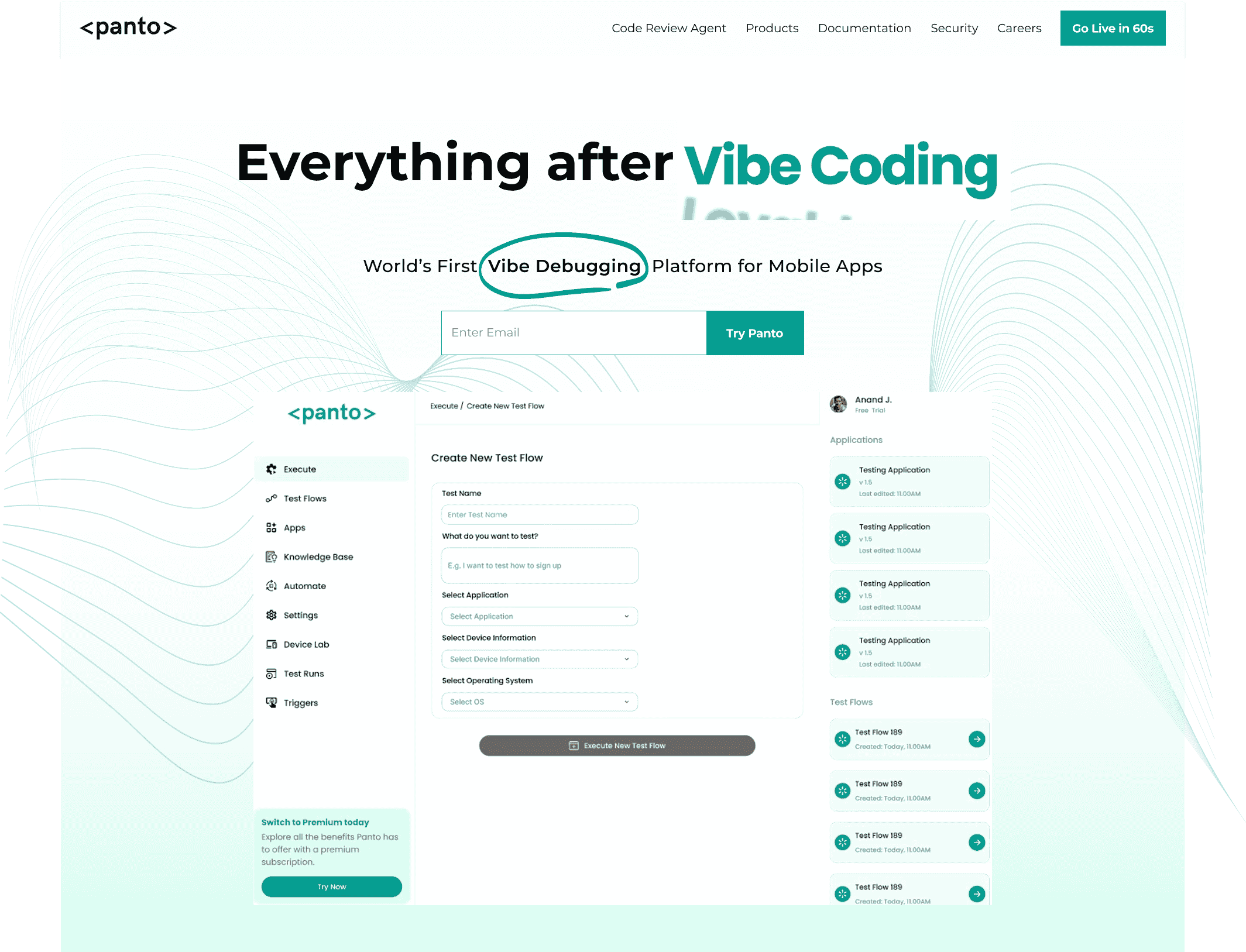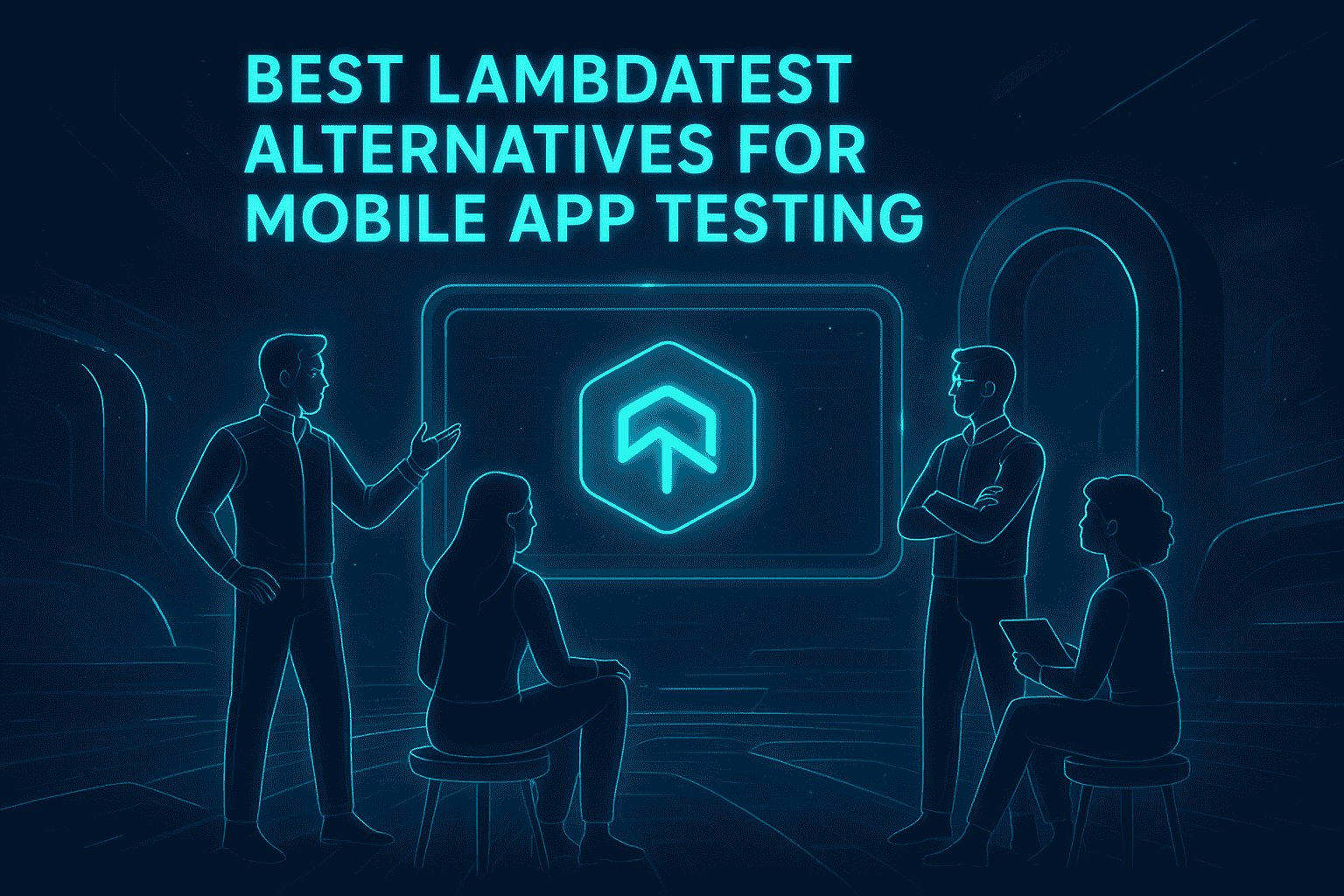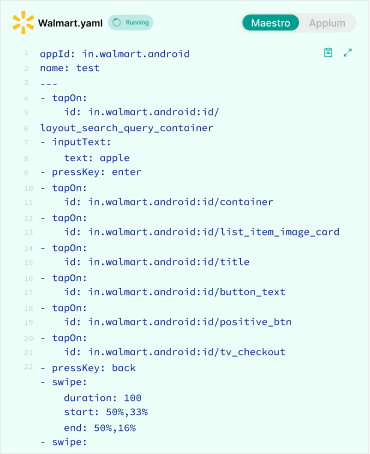Mobile app testing has become increasingly complex with the explosion of devices, operating systems, and screen sizes. While LambdaTest offers solid cross-browser and mobile testing capabilities, it’s not the only player in the game. Whether you’re looking for better AI-driven QA, more comprehensive device coverage, or specialized testing features, there are several powerful LambdaTest alternatives worth considering.
Why Choose From LambdaTest Alternatives?
LambdaTest provides a robust cloud-based testing platform with over 3,000 browser and OS combinations, but it has significant limitations that may not suit every team’s needs. Users report stability issues with simulators, high test execution times, and session management problems that can disrupt workflows. Additionally, LambdaTest focuses primarily on web app testing, which may not provide the depth required for comprehensive native mobile app testing.
Performance concerns are another critical consideration for development teams. Remote testing can be noticeably slower compared to real devices, creating frustration during full end-to-end testing scenarios. The pricing structure presents challenges, and some users note that mobile browser testing options are less comprehensive compared to desktop testing features, limiting flexibility for cross-platform projects.
Real Device Testing Requirements
Native app testing demands access to actual devices rather than just simulators or emulators. Real devices reveal battery consumption, network connectivity issues, and hardware-specific bugs that never appear in controlled environments. Teams need platforms providing day-one access to new devices and OS releases for continuous compatibility. The ability to test under real-world conditions like poor network connectivity and varying device orientations becomes essential for quality assurance.
Automation Framework Flexibility
Different teams work with different automation frameworks like Appium, Espresso, XCUITest, and proprietary solutions. Platforms that support multiple frameworks provide better integration with existing workflows and reduce vendor lock-in risks. Natural language test case generation is increasingly valuable for teams seeking to reduce manual coding overhead. Self-healing test automation that adapts to UI changes represents the next generation of intelligent software solutions.
Security and Compliance Needs
Modern mobile apps handle sensitive user data requiring robust security testing and compliance certifications. Platforms offering SAST checks, secret detection, and infrastructure-as-code scanning provide comprehensive security coverage. SOC 2 and ISO certifications become essential for enterprises operating in regulated industries. Integration of security checks directly into the testing pipeline ensures vulnerabilities are caught before production deployment.
Top 10 LambdaTest Alternatives Compared
1. Panto AI: AI-Powered Vibe Debugging Platform

Panto AI QA is a next-generation mobile app testing platform built to simplify and accelerate QA automation using AI. Panto’s AI agent intelligently navigates apps based on natural language instructions, breaking down complex features and user flows step by step to execute on real devices. From this execution, the platform automatically generates deterministic test scripts that are library agnostic, supporting Appium, Maestro, and raw script formats.
With seamless integration into BrowserStack and LambdaTest, teams can instantly execute tests on real device farms or trigger CI/CD-based regression runs. Panto’s self-healing scripts adapt to frequent UI changes without manual intervention, significantly reducing maintenance effort and QA overhead.
The platform is designed as a no-code automation experience, delivering a lovable approach but for Vibe Debugging, where testers and PMs can automate complex mobile app flows in minutes. As the only solution that blends true no-code testing, AI-powered agent execution, and deterministic script generation, Panto AI QA makes mobile QA scalable, easy to use, and future ready.
Unique Features: Natural language test generation, self-healing automation, 30,000+ SAST checks, real device testing, instant debug reports with videos and screenshots.
Best For: Development and QA teams seeking an end-to-end platform combining code review, security scanning, and intelligent automation.
Pricing: Contact Panto AI at hello@getpanto.ai for customized pricing.
2. BrowserStack: Enterprise-Grade Device Coverage

BrowserStack is one of the most widely used cloud testing platforms, offering access to over 3,000 real iOS and Android devices for comprehensive mobile app testing. The platform excels in providing real-world testing conditions, allowing teams to test native device features like geolocation, push notifications, and biometric authentication. BrowserStack supports both manual testing through App Live and automated testing through App Automate with Appium, Espresso, XCUITest, and EarlGrey frameworks.
Real-time debugging includes comprehensive device logs, text logs, video recordings, and screenshots for every test run, making issue identification quick and efficient. The platform enables parallel debugging across thousands of devices simultaneously, dramatically reducing test execution time and accelerating release cycles. BrowserStack provides instant access to both latest flagship devices and legacy models, ensuring consistent performance across your entire user base.
Unique Features: 3,000+ real device cloud, native app automation support, real-time debugging, parallel testing, CI/CD integration.
Best For: Enterprise teams requiring extensive device coverage and mature ecosystem integrations.
Pricing: Higher pricing compared to competitors but justified for large organizations needing reliability at scale.
3. Sauce Labs: Security-First Testing Platform

Sauce Labs transforms mobile testing with a scalable, secure platform offering access to over 700 different browser, platform, OS, and device combinations. AI-driven actionable insights filter data noise and surface critical issues, reducing hours of manual analysis to mere minutes. The platform is SOC 2 Type II, SOC 3, ISO 27001, and ISO 27701 certified, making it ideal for organizations maintaining strict compliance with global regulations.
Sauce Labs supports multiple automation frameworks including Appium, Espresso, and XCUITest, providing flexibility for teams with different technical stacks. The platform captures critical bugs and error data at every stage of the development lifecycle, providing complete visibility into app code quality. Sauce Connect enables secure testing of applications behind customer firewalls, allowing internal and staging environments to be tested safely.
Unique Features: 700+ device combinations, AI-driven insights, SOC 2 and ISO certified, automated and manual testing, secure tunnel for internal apps.
Best For: Organizations prioritizing security compliance, scalability, and end-to-end capabilities across the development lifecycle.
Pricing: Enterprise-focused with custom contracts for large-scale deployments.
4. Perfecto: Day-One Device Access

Perfecto stands out with industry-leading same-day coverage for all new devices and operating system releases, including day-one access to major updates like iOS 18. The cloud-based platform provides instant access to over 3,000 real devices, eliminating expensive in-house device labs and associated maintenance costs. Perfecto supports cloud, on-premise, and hybrid deployments, giving organizations flexibility in structuring testing infrastructure.
Advanced reporting and analytics provide detailed insights into test results, execution history, and device performance, enabling data-driven quality decisions. The platform simulates real-world conditions including various network speeds, connectivity scenarios, device configurations, and battery levels. Teams can automate tests using popular frameworks such as Appium, Selenium, Espresso, and XCUITest while accessing robust debugging tools.
Unique Features: 3,000+ real devices with instant access, day-one coverage of new devices and OS releases, cloud/on-premise/hybrid deployment, advanced analytics.
Best For: Enterprises requiring comprehensive device management and immediate access to latest devices.
Pricing: Custom enterprise pricing based on device needs and deployment configuration.
5. Kobiton: Lightning-Fast Mobile Testing

Kobiton delivers the fastest mobile test automation available, featuring Lightning Mode with device launch times in seconds and millisecond response times creating true device-in-hand experience. The platform’s AI-powered QA testing leverages machine learning to automate issue detection and fixing, enabling higher automation coverage while reducing human error.
Kobiton’s low-code validations allow teams to automate visual, accessibility, and performance testing without complex coding, making testing accessible to non-technical team members. Real device testing ensures apps are tested under actual conditions, providing accurate insights and detecting device-specific bugs, battery consumption issues, and network problems. The session explorer provides an iMovie-like experience to relive test execution, rapidly pinpoint issues, and assign defects efficiently.
Unique Features: Lightning Mode with millisecond response times, AI-powered Appium script generation, no-code automation, real device cloud, visual and accessibility testing.
Best For: Mobile-first QA teams prioritizing real-device depth and Appium-based automation seeking faster automation.
Pricing: Scalable pricing based on device access and automation features required.
6. HeadSpin: Global Performance Intelligence

HeadSpin provides the industry’s widest global device infrastructure, enabling real-world evaluation on SIM-enabled mobile devices across more than 50 locations worldwide. The platform’s AI-driven insights and root cause analysis automatically surface valuable issues, providing clear explanations and actionable recommendations for faster debugging. HeadSpin captures key performance KPIs on real devices and networks to evaluate the impact of app, device, browser, and network performance on actual user experience.
The platform supports over 60 automation frameworks including Appium, Selenium, XCTest, and Espresso, giving teams flexibility in their test automation approach. Custom KPI detection allows teams to collect data on issues, session videos, and packet-level details, ensuring actionable insights for continuous improvement. Experience monitoring provides deep insights into user experience by analyzing real interaction data and correlating performance metrics with KPIs.
Unique Features: Global device infrastructure across 50+ locations, AI-driven insights and root cause analysis, SIM-enabled real devices, UX KPI tracking, 60+ automation framework support.
Best For: Teams testing across global networks, organizations requiring comprehensive performance monitoring and AI-powered testing intelligence.
Pricing: Enterprise-level pricing with custom contracts based on global infrastructure needs.
7. Appium: Open-Source Cross-Platform Framework

Appium remains the most popular open-source mobile testing framework, offering cross-platform automation for native, hybrid, and mobile web applications on iOS and Android. The framework supports multiple programming languages including Java, Python, JavaScript, C#, PHP, and Ruby, allowing teams to write tests in their preferred language. Appium requires no modification to the app’s source code, maintaining app integrity while enabling comprehensive traditional QA.
The framework uses platform-specific automation engines—XCUITest for iOS and UiAutomator2 for Android—ensuring native performance and reliability. Appium supports parallel test execution across multiple devices and emulators, significantly speeding up workflows and improving scalability. The client-server architecture allows test scripts to communicate via REST API, translating commands into automation actions for the mobile platform.
Unique Features: Open-source and free, cross-platform iOS and Android support, multiple programming languages, no app modification, Selenium WebDriver integration.
Best For: Teams with technical expertise seeking a flexible, cost-effective solution with full framework control.
Pricing: Free and open-source, though teams may incur costs for device clouds or CI/CD integrations.
8. TestGrid: AI-Powered Codeless Testing

TestGrid offers an AI-powered end-to-end testing platform with built-in support for Selenium, Appium, and Cypress, making it easy to execute test cases on real devices. The platform’s record-and-play feature instantly transforms manual interactions into automated tests, eliminating coding complexities and streamlining workflows. TestGrid’s codeless mobile app test automation writing enables teams to quickly start automating without manually setting up servers, clients, and device configurations.
The real device cloud offers extensive genuine Android and iOS devices from major vendors like Apple, Samsung, Google Pixel, and OnePlus. Visual testing capabilities allow teams to test visual changes without adding external SDKs to projects. Performance stress testing ensures apps handle high user loads, testing code quality KPIs like response time and error rates under realistic conditions.
Unique Features: AI-powered codeless automation, record-and-play functionality, real device cloud, built-in Selenium/Appium/Cypress support, visual testing without SDK.
Best For: Teams wanting no-code automation with real devices and cost-effective testing without extensive device infrastructure.
Pricing: Value-driven pricing for growing teams expanding their device matrix.
9. Katalon: Low-Code Testing Platform

Katalon Studio is built on top of Appium and Selenium, providing a ready-to-use test automation platform for mobile, web, API, and desktop applications. The low-code approach makes it accessible to users without extensive programming backgrounds, though it still offers flexibility for those preferring coding. Katalon’s record-and-playback functionality captures mobile interactions and automatically generates test scripts, significantly reducing test creation time.
TestCloud integration allows teams to perform automated tests on mobile native applications by uploading apps and tests to TestOps, then using TestCloud to orchestrate test executions. The visual representation of test steps makes tests reusable and customizable, even for team members without coding experience. Katalon provides comprehensive reporting capabilities exportable in multiple formats including HTML and PDF.
Unique Features: Low-code platform built on Appium and Selenium, record-and-playback functionality, Android and iOS support, TestCloud integration, visual test representation.
Best For: QA teams without extensive programming backgrounds seeking ease of use without sacrificing capability.
Pricing: Tiered pricing for individuals and teams, free version available with limited features.
10. Ranorex: Flexible Automation for All Skill Levels

Ranorex Studio delivers comprehensive mobile test automation with both codeless and coded options, making it suitable for testers and developers with varying technical expertise. The platform supports wireless or USB connections to Android and iOS devices without jailbreaking. Ranorex’s powerful RanoreXPath query language uniquely identifies UI elements rather than relying on coordinates, making tests robust against UI changes.
The design-once, run-everywhere approach allows teams to create a single test and instantly reuse it across OS versions, browsers, and devices by changing just one parameter. Comprehensive reporting provides pie charts summarizing all test cases with log messages and screenshots giving graphical overviews. Ranorex integrates directly with version control systems like SVN, TFS, and GitLab, plus CI/CD servers such as Jenkins and Bamboo.
Unique Features: Codeless and coded automation options, RanoreXPath for robust element identification, wireless or USB connection, comprehensive reporting, CI/CD integration.
Best For: Teams seeking flexible testing options for technical and non-technical users wanting design-once, run-everywhere efficiency.
Pricing: Commercial licensing with free trial available, pricing based on team size and features required.
LambdaTest Alternatives Comparison Matrix & Final Recommendations
| Tool | Real Devices | AI Features | Framework Support | Security Features | Ease of Use | Pricing Model | Best For |
|---|---|---|---|---|---|---|---|
| Panto AI | Yes (iOS & Android) | Vibe Debugging, Self-healing | Proprietary + integrations | 30,000+ SAST checks | Moderate (AI-guided) | Custom | End-to-end QA + Security |
| BrowserStack | Yes (3000+) | Limited | Appium, Espresso, XCUITest | Standard | Moderate | Per-minute usage | Enterprise scale |
| Sauce Labs | Yes (700+) | AI-driven insights | Appium, Espresso, XCUITest | SOC 2, ISO certified | Moderate | Custom enterprise | Compliance-first |
| Perfecto | Yes (3000+) | Limited | Appium, Selenium, Espresso | Standard | Moderate | Custom enterprise | Day-one device access |
| Kobiton | Yes (Cloud) | AI-augmented testing | Appium-focused | Standard | Easy (Lightning Mode) | Scalable | Speed + performance |
| HeadSpin | Yes (50+ locations) | AI-driven root cause | 60+ frameworks | Standard | Moderate | Enterprise | Global testing |
| Appium | Emulator/Real | None | Appium (Open-source) | None | Hard (Code-based) | Free (Open-source) | Technical teams |
| TestGrid | Yes (Multiple vendors) | AI-powered codeless | Selenium, Appium, Cypress | Standard | Easy (No-code) | Value-based | Growing teams |
| Katalon | Yes (via BrowserStack) | Limited | Appium, Selenium | Standard | Easy (Low-code) | Tiered + Free | Non-technical QA |
| Ranorex | Yes (Wireless/USB) | Limited | Appium, Selenium | Standard | Easy (Codeless/Coded) | Commercial + Trial | Flexibility |
Choosing Your LambdaTest Alternatives by Your Priorities
AI-Driven Automation: Panto AI leads with vibe debugging, self-healing automation, and integrated security scanning that eliminate manual overhead. The platform combines code review, security, and QA automation in one unified solution designed for modern DevOps workflows.
Enterprise Scale: BrowserStack and Sauce Labs offer proven infrastructure supporting thousands of concurrent tests across massive device networks. Both LambdaTest alternatives excel at handling large organizations with complex testing requirements and strict compliance needs.
Global Testing: HeadSpin stands out with real device infrastructure across 50+ locations, enabling performance testing under true global network conditions with SIM-enabled devices.
Budget-Conscious Teams: Appium remains the best free option for technically strong teams, while TestGrid provides excellent value for growing teams seeking codeless automation with real devices.
User Experience: Kobiton’s Lightning Mode provides the fastest, most responsive real device experience, perfect for teams prioritizing speed and direct device interaction.
Implementation Strategy
Start with your team’s technical capabilities and specific testing challenges. Teams without coding expertise should prioritize Katalon or TestGrid for their intuitive interfaces. Technical teams can leverage Appium for full control or Panto AI for advanced AI-driven capabilities. Consider your app’s target audience geography. if global performance matters, HeadSpin’s 50+ locations justify the investment. For security-first organizations, Sauce Labs’ comprehensive certifications and compliance framework make it an ideal choice.
Making Your Final Decision
Evaluate LambdaTest alternatives using these key criteria: device coverage for your target markets, automation framework compatibility with your stack, real device access for accurate testing, security and compliance features, pricing structure aligned with your budget, and ease of adoption for your team.
Most LambdaTest alternatives offer free trials—leverage these to test real-world scenarios matching your mobile app’s complexity. The best platform aligns with your immediate needs while scaling with your organization’s growth and evolving quality requirements.






